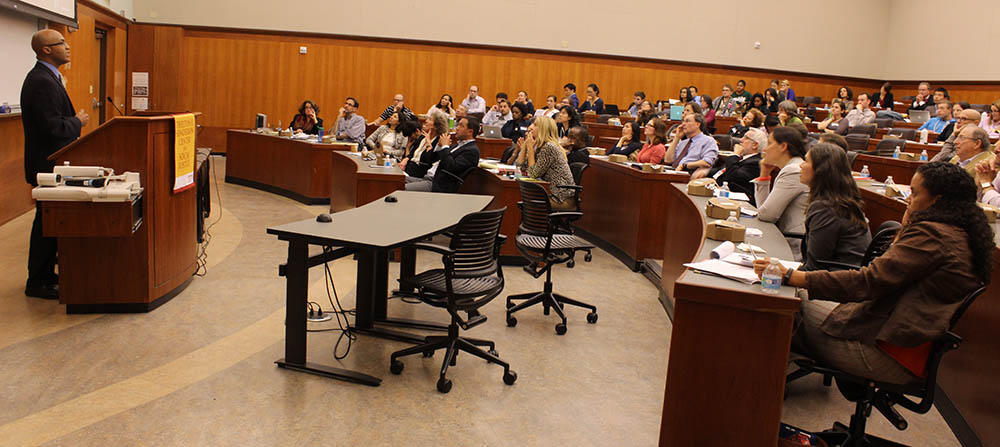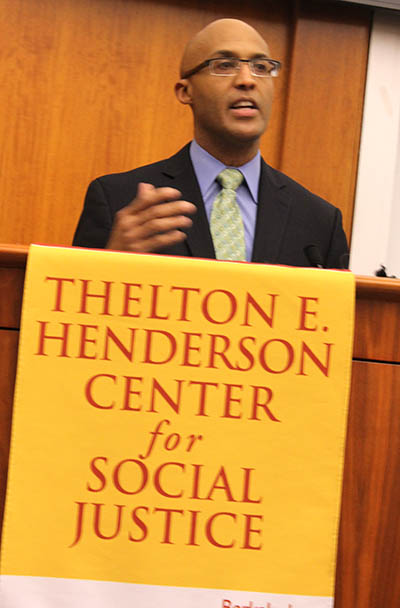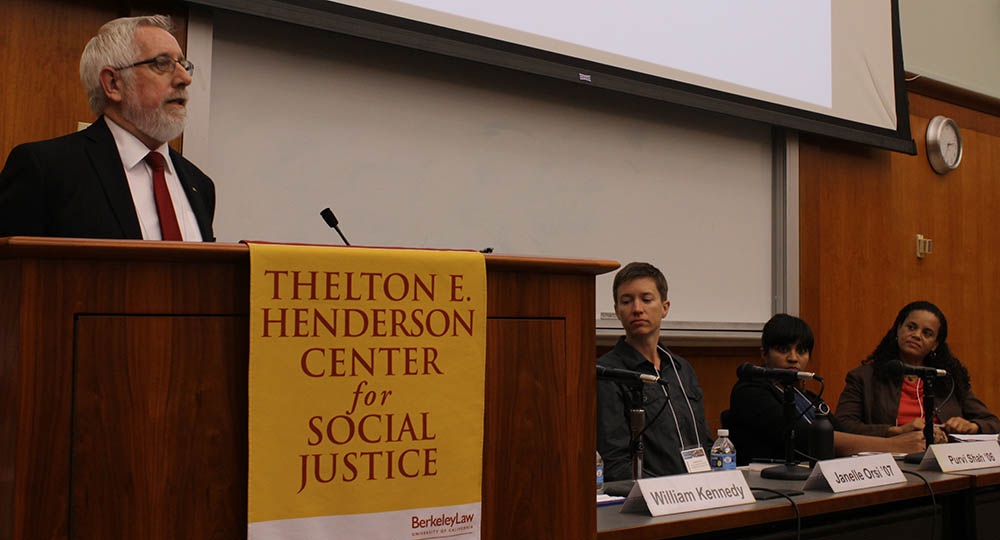
by Stephanie Llanes and Rasheed Shabazz | October 30, 2014
The year 2014 marks half a century since the War on Poverty sought to integrate the New Deal and expand opportunity for all. On Oct. 16-17, the Thelton E. Henderson Center for Social Justice at the Berkeley Law School hosted a symposium to examine lessons from the last 50 years and the historical and ongoing role lawyers and law students play in reducing inequality and expanding opportunity.
The symposium, “The New Prosperity Law: Expanding Opportunity and Reducing Inequality 50 Years after the War on Poverty” featured a lecture by Alan Jenkins, executive director of the Opportunity Agenda, and panel discussions and workshops by alumni.
 Jenkins outlined four historical trends that have created a number of opportunities to transform America today: changes in public opinion, demographics, media, and the nature of social movements. Despite rhetoric that government is bad, many people value a fair and inclusive society with opportunity for all and believe the government has responsibility in creating the conditions to make such a reality. “Inequality is human made and can be human fixed,” Jenkins said.
Jenkins outlined four historical trends that have created a number of opportunities to transform America today: changes in public opinion, demographics, media, and the nature of social movements. Despite rhetoric that government is bad, many people value a fair and inclusive society with opportunity for all and believe the government has responsibility in creating the conditions to make such a reality. “Inequality is human made and can be human fixed,” Jenkins said.
In addition to the public being “persuadable”, the changing demographics and the changing media landscape will also have an impact. People of color are a rising percentage of the American electorate. Race is still relevant in three ways, Perkins explained. Stereotypes and bias both shape perceptions of poor people and how people view poverty as an issue. A common perception is that “Poverty (is) a black problem,” Jenkins said. The racialized view of poverty, and stereotypes undermine support for solutions.
News media continues to shape beliefs about race, but digital and social media have created low barriers to entry and allow for diversity and activism. Without the traditional media gatekeepers barring access, advocates can change the dominant narratives about race and poverty by telling their stories. “If we cannot tell our story, and change the beliefs of Americans, we will lose,” Jenkins said. Many social movements are harnessing these technologies for transformative change.
An afternoon panel discussion focused on the role of lawyers and the “New Prosperity Law.” Panelists included William Kennedy, managing attorney for Legal Services of Northern California’s Sacramento office, and alumni Janelle Orsi, executive director and co-founder of Sustainable Economies Law Center and Purvi Shah, Bertha Justice Institute Director at the Center for Constitutional Rights. Tirien Steinbach, executive director of the East Bay Community Law Center moderated the panel. The panel was followed by breakout sessions on different law practices: race-conscious, multi-disciplinary, and movement-based practices.

Thursday evening featured a dinner lecture by Berkeley Law Professor Ian Haney López. He spoke on the need to reclaim the meaning of liberalism, distinguished post-racialism versus the centrality of race, and discussed the politics of changing demographics. Liberalism ended with the War on Poverty, López said, when the War on Poverty attempted to integrate Black people into the New Deal. Post-racialism is a liberal response to “colorblindness,” the myth that racism would end by not talking about race. Instead, colorblindness allows for coded remarks about race, as he explains in his book, Dog Whistle Politics. “Post-racialism is a strategic decision to not talk about race,” he said. Liberals responded by not talking about race and subsequently avoid addressing marginalization.
"Whiteness keeps white people from seeing concentrated wealth as the real threat... (instead of) racial minorities."
- Ian Haney López
Considering the changing nature of how race is categorized, waiting for America’s demographics to change will not end inequality. Since many Latinos–the largest growing ethnic population–see themselves as white, for example, the white population could actually expand. “Whiteness is a fundamental way of saying who belongs,” Haney López said. “Whiteness keeps white people from seeing concentrated wealth as the real threat, (instead of) racial minorities.” The future could be easily be a system with the white minority at the top of a hierarchy, “honorary whites”, and black people at the bottom, he suggested. “That’s our racial future, unless we have a racial justice movement.”
The second day featured working groups focused on the teaching, research, and service missions of law schools, including a workshop with Prof. Bertrall Ross, co-faculty director of the Henderson Center and a member of the Haas Institute Diversity and Democracy Cluster. The symposium ended with tool kits for students passionate about ending inequality and expanding opportunity in the next 50 years.
“I really thought that the discussion around analyzing popular culture and using entertainment outlets and social media to effectuate change was powerful and insightful,” Sloan Whiteside, a second year law student said. “Often times these means are overlooked but are really effective ways to reach a large group of individuals and not only change what they think about but really impact the way they think.”
The symposium was hosted by the Thelton E. Henderson Center for Social Justice, a training and research center at the Berkeley Law School that prepares future lawyers to represent marginalized communities and produce scholarship on issues of gender, poverty and race. Prof. john powell, director of the Haas Institute, kicked off the Center’s Ruth Chance Lecture series in September. This year’s series commemorates the 50-year anniversaries of the Civil Rights Act, launch of the War on Poverty and the Free Speech Movement. Dimple Abichandani is executive director of the Henderson Center. The Berkeley Law School, California Law Review, Center for the Study of Law and Society, East Bay Community Law Center, and the Haas Institute for a Fair and Inclusive Society co-sponsored the symposium.
Photos: Alan Jenkins of the Opportunity Agenda speakers during the "New Prosperity Law" symposium hosted by the Thelton E. Henderson Center for Social Justice on Oct. 16. William Kennedy speaks during the "New Prosperity Law" symposium hosted by the Thelton E. Henderson Center for Social Justice on Oct. 16.
Stephanies Llanes is a second year law student at the Berkeley School of Law and research assistant to john powell, director of the Haas Institute. Rasheed Shabazz is a fellow at the Haas Institute.




